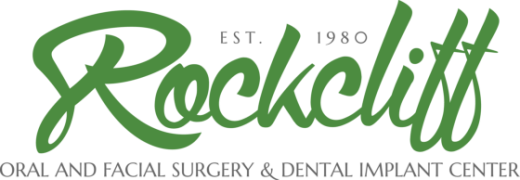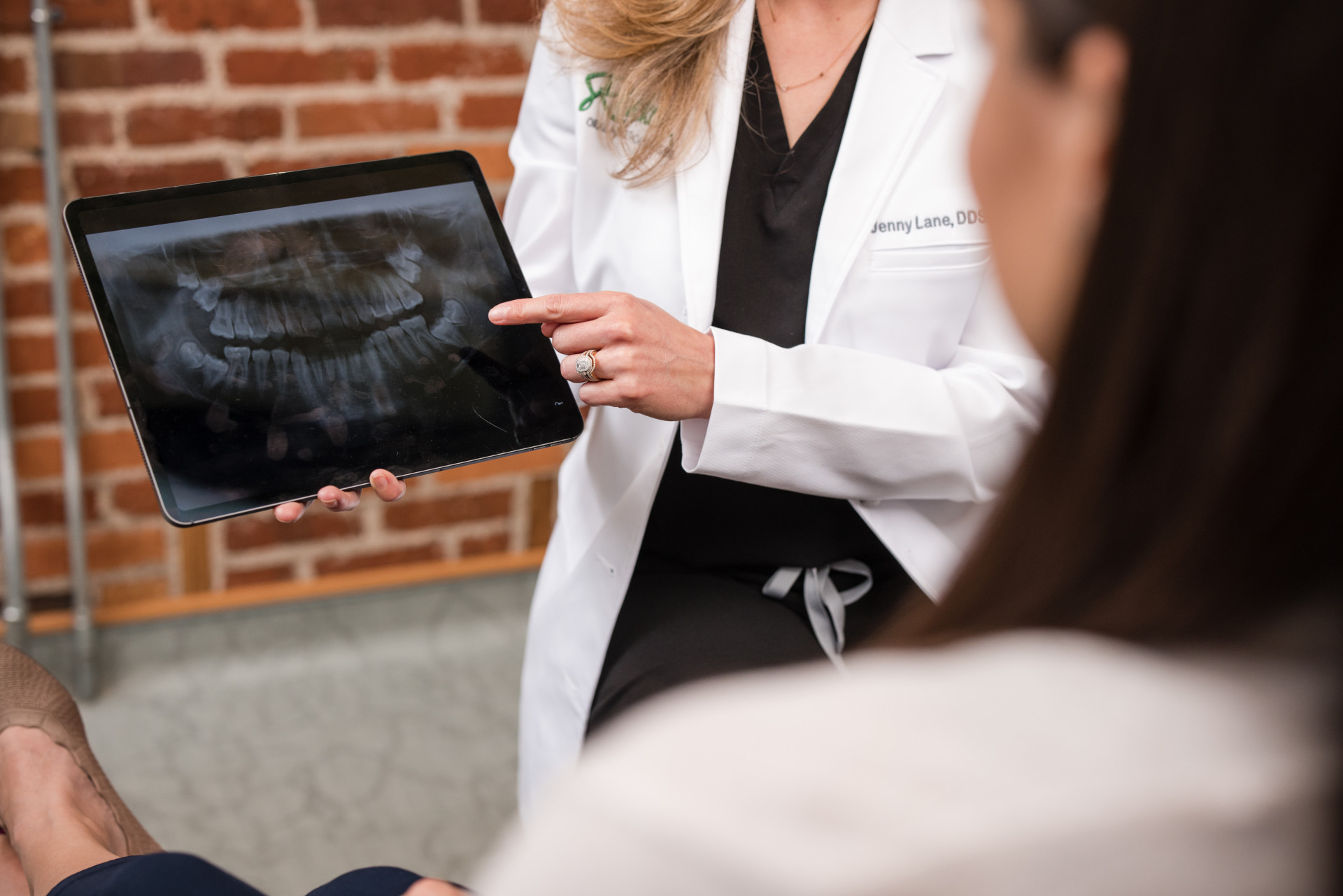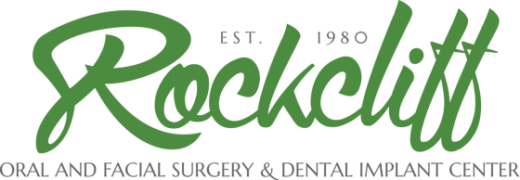What problems with wisdom teeth can occur?
Most people do not have enough room in their mouth for wisdom teeth to grow in completely. When this occurs, wisdom teeth are considered to be impacted. Impacted wisdom teeth can remain trapped under the tissues or eventually break partially through the gums.
Impacted wisdom teeth can cause many problems, including:
- Abscesses and other infections
- Periodontal disease
- Cavities
- Damage to adjacent teeth
- Crowding of the surrounding teeth
- Cyst or tumor development
When active disease develops, the wisdom teeth should be removed. This is best determined by an examination by one of our experienced specialists.
Do wisdom teeth usually hurt when there are problems?
Not all wisdom teeth with active disease will be painful. Often symptoms do not appear until the disease is fairly advanced.
Even wisdom teeth that have grown in completely can develop problems. Wisdom teeth are often difficult to clean, leading to cavities and periodontal disease. Periodontal disease is a low-grade infection of the gums caused by bacteria that grow in the deep crevices around wisdom teeth. Periodontal disease can lead to inflammation and bone loss around your wisdom teeth over time. This infection can then spread from the wisdom teeth to the other surrounding teeth in your mouth.
How are wisdom teeth treated?
Wisdom teeth with active disease or with a significant risk of future disease should be removed.
Wisdom teeth are easier to remove in teens and young adults since the roots have not fully formed and the bone is softer. This shortens healing time and reduces the risk of damage to nearby nerves or other structures. Removal of wisdom teeth in adults can become more difficult, with slower recovery and increased postoperative symptoms compared to younger patients.
Wisdom teeth don’t always need to be removed. Wisdom teeth that grow in completely, are cleanable, and can be used without trauma to the cheeks or tongue, can be retained. Many wisdom teeth develop problems over time and periodic evaluation of any retained wisdom teeth is necessary to detect future disease.
What are the steps in treatment?
Evaluation
At your consultation you should expect to discuss your medical history, any medications you take, and undergo a brief health review. Your surgeon will perform a physical exam. X-rays are taken to evaluate the position of each wisdom tooth in the jaws. We take time to help you understand any potential problems associated with your wisdom teeth, any recommended treatment, and answer any questions you may have.
Surgery
Each surgery takes place in a private surgical suite at one of our four locations. This comfortable, personalized setting allows for safe and efficient treatment. All surgery is performed under appropriate anesthesia to maximize your comfort. In most cases procedures are performed under local anesthesia, nitrous oxide, or intravenous sedation. Please see our anesthesia options.
Recovery
Most patients will need a few days off work or school to recover. You will need to eat softer foods and avoid strenuous activities – including team sports. It is very important to keep your mouth clean to avoid infection. Learn more about our aftercare instructions.
Wisdom Teeth Removal Overview
The last permanent teeth to appear in the mouth are the third molars, more commonly known as wisdom teeth. Generally, not growing until the late teen years or early twenties, these late bloomers are a consistent source of dental trouble. This is because many people’s jaws are not sufficiently large to fit wisdom teeth, leading to impacted teeth that can cause infection, pain, or other complications.
Why Should I Have My Wisdom Teeth Removed?
Not everyone needs to have their wisdom teeth removed – for some people, they grow in just fine. But they can also cause serious problems, both when they first emerge and later in life. And because wisdom teeth are vestigial – i.e., they do not serve a necessary function for our survival – many patients decide to have them removed at a young age to avoid the possibility of any future complications.
Impacted wisdom teeth may grow in at an angle towards other teeth; at an angle toward the back of the mouth; or even stay trapped within the jawbone. This is not just highly painful, but also may lead to infection, gum disease, and can even damage other teeth. Even wisdom teeth that are not impacted may cause problems later in life. All of these are reasons to consult with an OMS about wisdom tooth removal.
Why Should I See an Oral and Maxillofacial Surgeon?
To perform complex procedures like reconstructive jaw surgery and wisdom tooth extraction, they undergo extensive education in medicine, dentistry, and surgery. This means that after completing dental school, they spend another 4-6 years in a surgical residency program, where they receive training in general surgery, anesthesia, and internal medicine. This lengthy and rigorous training makes an OMS an expert on procedures related to the jaw and face.
An OMS can evaluate whether your wisdom teeth are impacted and tell you whether surgery is the best option. Typically, an OMS will look for the following signs to indicate whether extraction is the right option:
- Wisdom teeth adversely affect a patient’s tooth alignment even after braces.
- A patient has difficulty cleaning their wisdom teeth.
- The wisdom teeth show signs of infection or decay.
- The wisdom teeth are causing pain.
- There are cavities on the teeth adjacent to the wisdom teeth.
If you are having any of these issues, an OMS will most likely recommend surgery.
What to Expect from Wisdom Teeth Extraction
After an OMS has determined that surgery is right for you, the procedure itself can be done outpatient quite quickly. The OMS will give you detailed instructions before the surgery, which are important to pay attention to; in particular, it is crucial not to eat before surgery. Most patients prefer to be sedated during the experience, and both local and general anesthesia are common.
Once you are under sedation, the OMS will perform the extraction. Their expert knowledge of facial and jaw structure allows them to remove the impacted teeth with minimal intrusion, and the actual procedure is usually done in no time at all.
After surgery, it is important to closely follow the instructions given to you by your OMS. Wisdom tooth extraction is a very common procedure, and serious complications are rare, but certain risks can be prevented by proper aftercare. In particular, aftercare can help you avoid a painful condition known as dry socket. Dry socket will go away on its own, but it’s better to avoid it in the first place by listening carefully to your OMS. For proper aftercare, your OMS might advise you to:
- Avoid strenuous activities for about a week.
- Eat only soft foods for 24 hours.
- Do not brush your teeth or floss for 24 hours.
- Avoid smoking for at least 72 hours.
By following these instructions, which are informed by the expert knowledge of the OMS, most patients should be able to avoid painful complications like dry socket. In most cases, patients should expect a full recovery in a few days to a week. There may be some lingering pain, for which you may be prescribed medication. But by consulting with an OMS and drawing on their expert knowledge and experience, you can alleviate pain, avoid the risk of infection, and move forward with a happier, healthier smile.
Before, During, And After Surgery Tips and Information
What Are Wisdom Teeth and Why Do They Need to Be Removed?
Wisdom teeth are a set of upper and lower third molars that typically come through when someone reaches their teen years—usually starting around 17 years of age. For some people, their wisdom teeth come in with plenty of space and are properly aligned. However, around 80% of young adults experience problems with their wisdom teeth. This can lead to impaction, meaning they remain trapped under the gums and can cause several health concerns, including:
- Abscesses and other infections
- Crowding of the surrounding teeth
- Cyst or tumor development
Before, During, And After Surgery
Evaluation
The first step in having your wisdom teeth removed is a discussion with your oral and maxillofacial surgeon. This typically involves a physical exam and X-rays. They will chat with you about a recommended treatment plan, ask about your medical history, and answer any questions you might have. Oral and maxillofacial surgeons are skilled at advanced extraction techniques and highly trained in safely administering sedatives, such as anesthesia. They can offer you fully thought-out treatment plans that fit your needs.
Procedure
The typical wisdom tooth extraction takes around 60 minutes depending on the number of teeth you need removed, how complex the surgery is, and your overall treatment plan. However, you can expect to be in the office for about 90 minutes to two hours. It’s very important to remember not to drink or eat anything for up to eight hours before your surgery as it can complicate any local anesthesia, nitrous oxide, or IV sedation that may be used.
Post-Surgery
Immediately following the surgery, you’ll feel groggy, light-headed, or even sleepy, so having a safe ride home is a must. Wisdom tooth extraction can affect patients differently depending on the complexity of the surgery. It’s important to understand what you can expect in the days, and weeks to follow.
24 Hours After Surgery
As your anesthesia continues to wear off, you might notice some pain or discomfort during this time. It’s also common to experience bruising or swelling in the area. You might be prescribed some sort of pain management medication. Remember to ask your surgeon beforehand about any side effects and responsible dosing. You can also start eating around this time. But you’ll need to stick to liquids and soft foods, such as broth or Jell-O. Remember to avoid straws, brushing your teeth, or spitting, as these can dislodge the blood clot covering the socket, otherwise known as a dry socket.
One Week After Surgery
Any symptoms of discomfort or soreness should peak around day three and begin to wear off after day seven. It’s around this time that you can return to strenuous activities, such as group sports or working out. You can also start brushing the extraction site but remember to be gentle!
One Month After Surgery
By the end of the first month, you should be back to your normally scheduled routine. And while the extraction site might look a little strange, you can safely brush and floss the area.
Like all health concerns, it’s better to get ahead of the issue before there’s a problem. Talk to your oral surgeon before you experience any negative side effects to determine if you will need wisdom teeth extraction in the future. It’s also a good idea to plan the surgery in advance since significant recovery time from school or work can be required. Schedule an evaluation with one of our expert oral and maxillofacial surgeons today.







